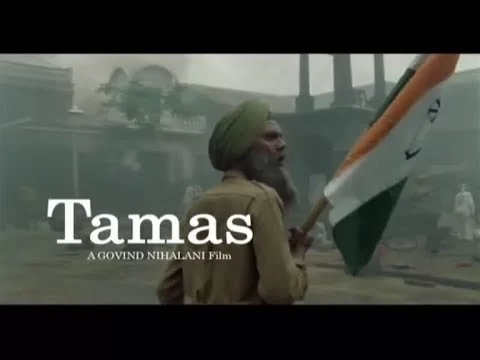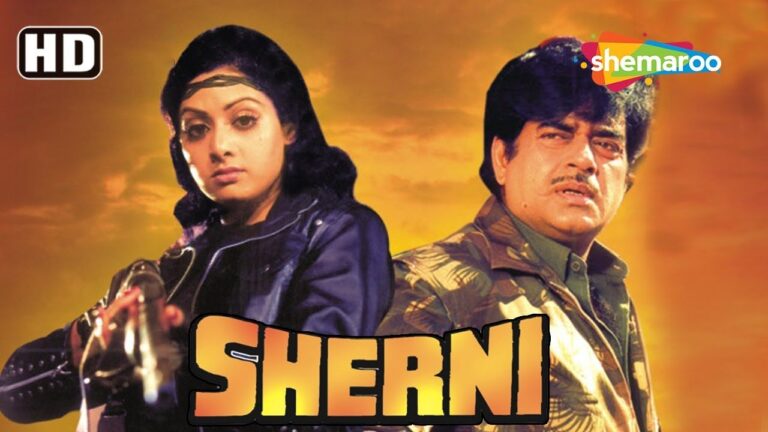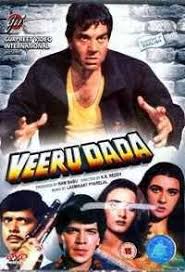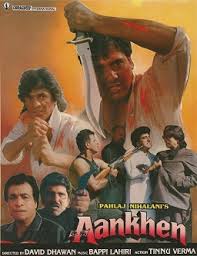
Tamas movie is a 1988 Bollywood Hindi drama film directer is Govind Nihalani while the producer is Lalit M. Bijlani.
The film’s star cast are Om Puri, Deepa Sahi, Bhisham Sahni, and Surekha Sikri.
It is based on Bhisham Sahni’s same-titled Hindi novel from 1974, which received the author the Sahitya Akademi Award in 1975. The movie explores the struggle of emigrant Sikh and Hindu families to India as a result of the partition, set against the backdrop of riot-stricken Pakistan at the time of India’s split in 1947.
It was initially shown as a miniseries on India’s national broadcaster Doordarshan and then as a one-time, four-hour feature film. The Nargis Dutt Award for Best Feature Film on National Integration was one of its three victories at the 35th National Film Awards. It debuted as a series on History TV18 in August 2013.
Cast and Crew
- Director : Govind Nihalani
- Screenplay : Bhisham Sahni
- Producer : Lalit M. Bijlani,Freni Variava
- Star cast : Om Puri,Deepa Sahi,Bhisham Sahni,Surekha Sikri
- Cinematography: V. K. Murthy
- Editor: Sutanu Gupta
- Art director: Ajit Patnaik
- Music director : Vanraj Bhatia
- Distributor: Blaze Entertainment Pvt Ltd
- Release date: 1988
- Genre: Drama
- Running time: 298 minutes
- Country: India
- Language: Hindi
Tamas movie Story
When Pankaj Kapur’s character, the thekedar, enters Nathu’s business as he is wrapping up his job, he orders him to kill a pig for the doctor who needs it for therapeutic purposes. Nathu rejects this, stating that he has never killed a pig and has the appropriate skills, although he does agree to tan the hide if necessary providing that the piggery workers kill it. Thekedar persists and offers Nathu 5 rupees before leaving the store, claiming that the carcass would be collected by the jamadar the following morning.
The following morning, Bakshiji (A.K. Hangal) and a few other political party members clean drains in a Muslim mohalla while singing nationalistic songs as a form of propaganda. They are enthusiastically welcomed at the mohalla, where the locals help them clean the drains. Later, an elderly Muslim confronts them and requests that they leave for their own safety. The party participants are soon attacked with stones from nearby houses, and they abandon the area. Then, party members find a pig corpse that someone had thrown at a mosque’s stairs.
Bakshiji and Hayat Baksh (Manohar Singh), the Muslim League’s spokesman, go to the home of Deputy Commissioner Richard (Barry John) out of concern about communal turmoil and to persuade him to take preventative action to calm things down. Richard advises the party members to push their various communities to preserve peace and order rather than accepting Bakshiji and Hayat Baksh’s ideas to send in the police or impose a curfew.
Nathu wonders if it was the same pig he slaughtered last night after seeing the pig corpse at the mosque and noticing some little chaos in the community. He encounters the thekedar on the street as he makes his way home in the evening. When Nathu tries to approach him, the thekedar quickly escapes. Nathu rushes home and tells his pregnant wife Kammo (Deepa Sahi) what he did after realizing it was the same pig. They can see burning buildings outside, and Nathu accuses himself of starting the outbreak of intergroup violence.
Nathu decides to leave the city with his mother and wife after sensing danger. They set out on foot, with Nathu carrying his elderly, disabled mother. In the middle of the journey, Nathu’s mother passes away and must be burned in the wilderness without the usual burial rituals, further devastating the guilt-ridden Nathu who, in his innocence, blames himself for the holocaust.
The lone Sikh family in the adjacent area is made up of Harnam Singh (Bhisham Sahni) and his wife Banto (Dina Pathak). They also intend to travel to the Sikh community where their daughter Jasbir (Uttara Baokar) lives. They walk for the entire night in search of refuge before arriving at a settlement the next morning. The home is owned by Muslim Ehsan Ali (Iftekhar), a longtime acquaintance of Harnam Singh. During the day, Harnam Singh and Banto hide at the home, but at night, Ehsan’s son finds them and orders them to leave.
The following morning while travelling, they come upon Nathu and his wife in the woods, and they all proceed to a gurudwara where Jasbir and a number of other Sikhs had sought refuge.
Teja Singh (Amrish Puri), the head of the Sikh council, tells the Sikhs at the gurudwara that if Muslims are constantly acquiring weapons, so should they. Later that evening, a junior granthi arrives at the gurudwara and informs Teja Singh that the Muslims are requesting a 2 lakh rupee truce since they are aware that the Sikhs are outnumbered and inadequately equipped. The granthi and Nathu are sent to negotiate with the Muslims when Teja Singh and the Sikh council find the sum to be excessive.
From the gurudwara’s terrace, Teja Singh and the council members watch as the Muslim crowd approaches Nathu and the granthi, surrounds them, and attacks them. Indignant Sikhs take up arms and enter the battlefield while yelling Sikh anthems. Back at the gurudwara, Jasbir incites the Sikh ladies to commit mass suicide by plunging into a well while some of them are holding their young children.
In a subsequent scene, Richard is shown speaking to a group of influential citizens. He tells them about the government’s relief efforts and suggests they join the Aman Committee to spread a message of peace. Aman Committee names Bakshiji and Hayat Baksh as vice presidents. Thekedars are seen yelling pro-communal unity chants after the conference.
Banto, Kammo, and Harnam Singh are in the camp for refugees. In order to locate Nathu, who hasn’t been seen since leaving with the junior granthi to negotiate with the Muslims, Harnam Singh asks a government official for assistance. If he had been discovered in the city, the employee advises that they make inquiries at the hospital tent where he may have been admitted. When Kammo spots Nathu’s body among the dead people lying in a queue on the ground, she falls to the ground sobbing.
She instantly begins to give birth, and nurses bring her inside the hospital tent. In addition to the baby’s screams emanating from within the tent, Harnam Singh and Banto can also hear shouts of “Allahu Akbar” and “Har Har Mahadev” coming from a distance as they are seated outside the tent.
Tamas movie on Youtube
Star cast
- Om Puri as a Nathu
- Deepa Sahi as a Karmo
- Uttara Baokar as Jasbir
- Amrish Puri as a Sardar Teja Singh
- A.K. Hangal as a Bakshi ji
- Manohar Singh as a Hayat Baksh
- Bhisham Sahni as a Harnam Singh
- Dina Pathak as a Banto
- K. K. Raina as a Mirdad
- Iftekhar as a Ehsan Ali
- Surekha Sikri as a Rajo
- Pankaj Kapur as a thekedaar
- Saeed Jaffrey as a Karim Khan
- Barry John as a Richard
- Karen Smith as a Liza
- K.K. Raina as a Socialist Comrade
- Surendra Pal as a Shah Nawaz
- Virendra Saxena as a Jarnail
- Pinchoo Kapoor as a Dilawar
- Akash Khurana as a Dr. Kapoor
- Harish Patel as a Karada
Tamas movie songs and Music
The film Music composer is Vanraj Bhatia.
Production
Pre-Production
The movie was based on the Hindi novel of the same name written by Pakistani immigrant Bhisham Sahni. The Sahitya Akademi Award was given to the book the year after it was released in 1974. Nihalani discovered the book while browsing a bookstore in Delhi while working as a second-unit director on Richard Attenborough’s historical movie Gandhi. The term “Tamas” (lit. Darkness) drew him to it. He learned that it was about the partition after reading a few pages.
He stated that he was a refugee who had fled to India following the partition and that he had a burning desire to produce a movie about it. He had read novels about the incident, such as Jhootha Sach, which he found to be “huge” and “intimidating,” but it wasn’t until he read Tamas that he found the guts to create a movie about it. Having seen Nihalani’s Aakrosh, Sahni felt sure that the latter could adapt his book into a movie.
Casting
Bhisham Sahni introduced the movie and was also cast in a crucial part alongside Dina Pathak.Nihalani then stated that he personally chose Amrish Puri, A. K. Hangal, Om Puri, and Pankaj Kapur, claiming that nearly all of them were young at the time of partition and had knowledge of the event to a high degree. Barry John, Surekha Sikri, and Deepa Sahi were scheduled for further significant parts. Om Puri, who was chosen for the starring role, was told to trim his beard and reduce weight in order to fit the part. He had to murder a pig in one of the movie’s scenes.
Shooting
The movie was actually filmed in Mumbai instead of Punjab, Pakistan, as Nihalani had initially planned. Nihalani claimed that he struggled to find producers until he contacted Lalit Bijlani of Blaze Films, who agreed to make the movie right away despite Nihalani alerting him of the controversy surrounding the plot.
Release
The film was shown as a six-part television series on Doordarshan, and it quickly gained enormous popularity. The movie generated a lot of controversy when it was first released because it included religious violence as a backdrop. Attackers broke into the Doordarshan office in Hyderabad. Nihalani was under police protection for eight weeks after receiving threats from unidentified parties.
After hearing a petition by city-based businessman Javed Siddiqui, who claimed the series “would poison the people’s minds,” the Bombay High Court ordered a stay to stop future screenings of the series on January 21, 1988.
The stay was overturned in favour of the series by the court two days later, with the justification that it treated the “fundamentalists” in both groups equally. A four-hour feature film based only on the series was subsequently released in cinemas. As part of the Fourth of July festivities, History TV18 rebroadcast the movie in August 2013 as an eight-part series.
Awards
National Film Awards (1988)
- Govind Nihalani – Won Best Feature Film on National Integration – Nargis Dutt Award
- Surekha Sikri – Best Supporting Actress
- Vanraj Bhatia – Best Music Direction
FAQs
Since Sahni had been an insider witness of the 1947 communal riots in Rawalpindi, it is thought that many of the conspiracies in the novel are largely inspired by the author’s real life. “Tamas” stands for one of the most terrible eras in Indian history.
The book is regarded as a magnificent addition to Hindi literature. According to Govind Nihalini, the book Tamas “is a prophetic warning against the use of religion as a weapon to gain and perpetuate political power.”
The film was shown as a six-part television series on Doordarshan, and it quickly gained enormous popularity. The movie generated a lot of controversy when it was first released because it included religious violence as a backdrop. Attackers broke into the Doordarshan office in Hyderabad.
Bhisham Sahni, an Indian author, dramatist in Hindi, and actor, lived from 8 August 1915 to 11 July 2003. He is best known for the novel and television script Tamas (“Darkness, Ignorance”), a stirring and emotional portrayal of the Partition of India.
References
Tamas. (2023, April 13). In Wikipedia. https://en.wikipedia.org/wiki/Tamas_(film)





